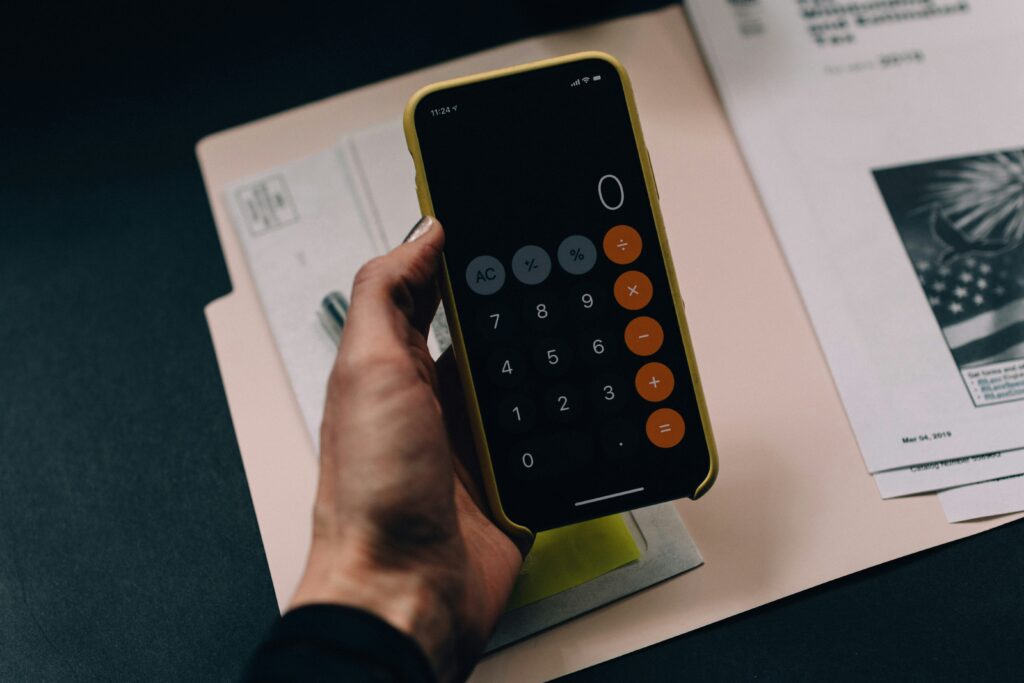As cryptocurrencies continue to grow in popularity as both an investment and a means of transaction, understanding the tax implications of these digital assets has become increasingly important. In the UK, the tax treatment of cryptocurrencies can be complex, as it involves navigating various regulations and guidelines set out by HM Revenue and Customs (HMRC).
The purpose of this article is to provide guidance on working out how much tax you pay on crypto holdings and transactions in the UK, ensuring that you remain compliant with the law while optimising your tax position.
How much tax do you pay on Crypto in the UK?
HMRC views cryptocurrency not as currency, but as an asset. This classification means that cryptocurrency transactions can trigger tax events under Capital Gains Tax (CGT) or Income Tax, depending on the nature of the transaction.
Calculating crypto tax involves determining the capital gains or income tax liabilities for your cryptocurrency transactions. Our crypto tax UK guide differentiates each one. Following a structured approach and working with a crypto tax accountant can help you accurately assess your tax obligations and ensure compliance with HMRC regulations.
Does crypto tax fall under Income Tax or Capital Gains Tax?
Determining whether your crypto activities are subject to Capital Gains Tax or Income Tax can seem daunting, but it essentially comes down to the nature of your transactions. The table below compares Capital Gains Tax and Income Tax, so you can identify how your crypto investments are taxed.
| Capital Gains Tax | Income Tax | |
| Definition | A tax on the profit made from selling an asset that has increased in value, such as cryptocurrencies, where the gain is the difference between the purchase price and the sale price. | Income Tax applies to cryptocurrencies when they are received as income, such as payments for goods or services, staking rewards, mining income, or airdropped tokens. |
|
|
|
| Calculation | Profit from disposal = sale price – purchase price | Value of crypto received as income |
| Reporting | Self assessment tax return
CT 600 (Corporation tax returns) for companies |
Self assessment tax return
CT 600 (Corporation tax returns) for companies |
| Examples of activities |
|
|
| Deadline | 31st of January (online return)
Corporate returns are filed within 12 months of a company’s financial year end |
31st of January (online return)
Corporate returns are filed within 12 months of a company’s financial year end |
| Allowances | Annual CGT allowance: £6,000 | Basic exemptions allowed under income tax laws |
How to calculate what you owe?
Gathering your transaction records
The transaction records you’ll need include dates, amounts, and the value of each transaction in GBP. Keeping detailed records is crucial and will keep the tax process simple. Whether you’ve sold Bitcoin, traded Ethereum for Litecoin, or received crypto as payment, every detail matters.
Now, it’s time to do some number crunching. If your transactions fall under Capital Gains Tax, you need to figure out the profit for each disposal. This means subtracting the purchase price (cost basis) from the sale price. For Income Tax, calculate the value of the crypto you received as income. This includes payments, staking rewards, mining income, and airdropped tokens.
Example: Let’s say you bought 1 Bitcoin for £20,000 and later sold it for £30,000. Your gain is £10,000. If you received 0.5 Bitcoin as payment for freelance work when Bitcoin was worth £40,000, your income is £20,000.
Applying allowances and rates
For Capital Gains Tax, you have an annual allowance (currently £6,000 for 2023/24). Subtract this from your total gains. The remaining amount is what you’ll be taxed on. Depending on your income tax band, you’ll pay 10% (basic rate) or 20% (higher/additional rate).
For Income Tax, add your crypto income to your other earnings for the year. This combined total will determine your tax rate: 20% for basic rate, 40% for higher rate, or 45% for additional rate taxpayers.
Reporting on your self-assessment tax return
Next, you’ll need to report your gains or income on your self-assessment tax return. This can be done online, and the deadline is 31 January following the end of the tax year. Make sure you include all relevant details to avoid any issues.
Paying your tax
Once you’ve submitted your tax return online, you will be able to see how much taxes you owe and in some cases HMRC will calculate how much you owe if there are additional sources of income. Pay this amount by the due date to avoid penalties and interest. It’s a good idea to set aside some funds throughout the year to cover your tax bill, so you’re not caught off guard. We recommend the use of a bank or online deposit account for keeping aside 20-30% of excess cash available within the business on a monthly basis, where practically possible. The interest you earn is a bonus for when taxes need to be paid. If you’d rather not risk having enough to pay tax, you can also proactively pay into your HMRC self-assessment or corporation tax account throughout the year to reduce your annual cash flow.
Keep monitoring and updating
Finally, keep an eye on your crypto activities, the latest tax regulations, and maintain up-to-date records. Crypto tax regulations and the market are constantly evolving, so staying informed is crucial. Regularly update your records and review your tax position to ensure ongoing compliance. A qualified crypto tax accountant can help you keep on top of these things.
Common mistakes to avoid with crypto tax
Keep these tips in mind and stay organised and you’ll be well on your way to getting your crypto taxes sorted without any issues.
Missing transactions
It’s easy to overlook a few trades here and there, but missing any transactions can mess up your tax calculations. Make sure you log every single crypto transaction, from buying and selling to trading and using crypto for purchases.
There is handy software like “Koinly” that can be connected to different wallets (without the exposure of triggering a transaction) and it captures various transactions that take place within the wallet.
Not knowing what’s taxable
Not everything you do with crypto is taxable. Buying with pounds? Not taxable. Selling, trading one crypto for another, or spending crypto? Those are taxable events. Knowing the difference can save you a lot of hassle and avoid enquiries from HMRC.
Messing up gain calculations
Calculating your gains can be tricky. You need to use the correct cost basis (what you paid for the crypto) and apply HMRC’s pooling method. It’s easy to get this wrong, so double-check your numbers.
Ignoring allowable costs
Don’t forget to deduct any costs associated with acquiring and disposing of your crypto. This includes the purchase price, transaction fees, and any other related expenses. These can reduce your taxable gains significantly.
Forgetting airdrops, staking, and mining
Income from airdrops, staking, and mining isn’t just free money—it’s taxable income. Make sure to report this correctly to avoid any surprises.
Using the wrong exchange rates
When converting crypto transactions to GBP, use consistent and accurate exchange rates. Using the wrong rates can lead to incorrect tax calculations.
Overlooking capital gains tax allowance
Remember, you get an annual Capital Gains Tax (CGT) allowance—£6,000 for the 2023/2024 tax year. Gains up to this amount are tax-free, so make sure to take advantage of this.
Misreporting wallet transfers
Moving crypto between your own wallets? These transfers aren’t taxable but need to be recorded accurately. Misreporting them can cause unnecessary complications.
Forgotten wallets
This is a bigger issue than most people imagine. You could have wallets that are totally forgotten and inaccessible. Once a year, it’s a good exercise to go through your personal records to see if the secret keys for long forgotten wallets can be discovered. If they are then accessible, check them for staking rewards, airdrops and the like.
Missing deadlines
The self-assessment tax return deadline is usually 31 January following the end of the tax year. Don’t wait until the last minute—late filing can mean penalties and interest on any tax you owe.
Not asking for help
Crypto tax rules are complex and always changing. If you’re unsure about anything, get advice from a crypto tax accountant who knows the ins and outs of cryptocurrency. It’s better to be safe than sorry!
How can a crypto tax accountant help?
As your dedicated crypto tax accountant, EVALUA8 would complete the calculations necessary to determine much tax you pay on your crypto activities in line with the UK regulations. Not only does our service enhance your crypto tax compliance through expertise but it also removes this time consuming task from your list.
This opens the doors for enhanced financial planning because you have complete visibility over your financial health to make enriched decisions.
Navigating crypto tax in the UK can be complex, but understanding the distinctions between capital gains and income tax, keeping accurate records, and following HMRC guidelines are crucial.
Staying informed and organised is the first step in compliance. Because of the complications that can arise during the calculation process, it’s always worthwhile to see a second opinion through professional help.
That’s where EVALUA8 comes in. We’re specialists in crypto tax, so our team is always up to speed with the latest regulations.
Contact us today to find out more about how we can benefit your business.



